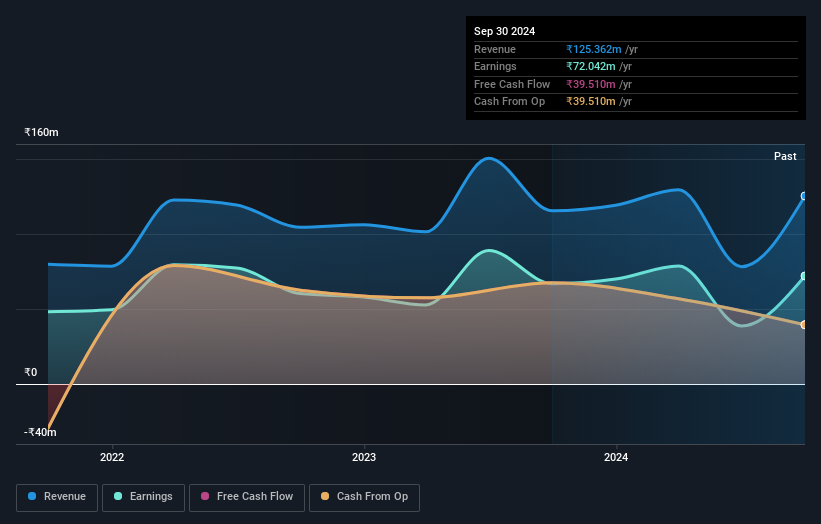- India
- /
- Capital Markets
- /
- NSEI:NBIFIN
N.B.I. Industrial Finance (NSE:NBIFIN) shareholders notch a 12% CAGR over 5 years, yet earnings have been shrinking

When you buy and hold a stock for the long term, you definitely want it to provide a positive return. Better yet, you'd like to see the share price move up more than the market average. But N.B.I. Industrial Finance Company Limited (NSE:NBIFIN) has fallen short of that second goal, with a share price rise of 78% over five years, which is below the market return. Some buyers are laughing, though, with an increase of 45% in the last year.
Since the stock has added ₹662m to its market cap in the past week alone, let's see if underlying performance has been driving long-term returns.
See our latest analysis for N.B.I. Industrial Finance
To quote Buffett, 'Ships will sail around the world but the Flat Earth Society will flourish. There will continue to be wide discrepancies between price and value in the marketplace...' One flawed but reasonable way to assess how sentiment around a company has changed is to compare the earnings per share (EPS) with the share price.
During five years of share price growth, N.B.I. Industrial Finance actually saw its EPS drop 0.3% per year.
By glancing at these numbers, we'd posit that the decline in earnings per share is not representative of how the business has changed over the years. Therefore, it's worth taking a look at other metrics to try to understand the share price movements.
The modest 0.02% dividend yield is unlikely to be propping up the share price. In contrast revenue growth of 4.5% per year is probably viewed as evidence that N.B.I. Industrial Finance is growing, a real positive. In that case, the company may be sacrificing current earnings per share to drive growth.
The graphic below depicts how earnings and revenue have changed over time (unveil the exact values by clicking on the image).

Balance sheet strength is crucial. It might be well worthwhile taking a look at our free report on how its financial position has changed over time.
A Different Perspective
It's nice to see that N.B.I. Industrial Finance shareholders have received a total shareholder return of 45% over the last year. Of course, that includes the dividend. Since the one-year TSR is better than the five-year TSR (the latter coming in at 12% per year), it would seem that the stock's performance has improved in recent times. Someone with an optimistic perspective could view the recent improvement in TSR as indicating that the business itself is getting better with time. It's always interesting to track share price performance over the longer term. But to understand N.B.I. Industrial Finance better, we need to consider many other factors. Take risks, for example - N.B.I. Industrial Finance has 3 warning signs (and 1 which can't be ignored) we think you should know about.
If you like to buy stocks alongside management, then you might just love this free list of companies. (Hint: many of them are unnoticed AND have attractive valuation).
Please note, the market returns quoted in this article reflect the market weighted average returns of stocks that currently trade on Indian exchanges.
Valuation is complex, but we're here to simplify it.
Discover if N.B.I. Industrial Finance might be undervalued or overvalued with our detailed analysis, featuring fair value estimates, potential risks, dividends, insider trades, and its financial condition.
Access Free AnalysisHave feedback on this article? Concerned about the content? Get in touch with us directly. Alternatively, email editorial-team (at) simplywallst.com.
This article by Simply Wall St is general in nature. We provide commentary based on historical data and analyst forecasts only using an unbiased methodology and our articles are not intended to be financial advice. It does not constitute a recommendation to buy or sell any stock, and does not take account of your objectives, or your financial situation. We aim to bring you long-term focused analysis driven by fundamental data. Note that our analysis may not factor in the latest price-sensitive company announcements or qualitative material. Simply Wall St has no position in any stocks mentioned.
About NSEI:NBIFIN
N.B.I. Industrial Finance
A non-banking financial company, engages in the investing in shares and securities, and financial activities in India.
Adequate balance sheet low.


